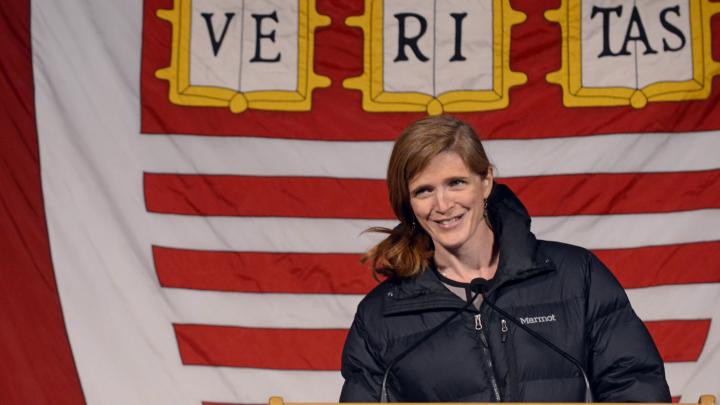“Your job is to make sure that democracy matures, expands, deepens, and delivers,” United States ambassador to the United Nations Samantha Power, J.D. ’99, told degree candidates in Harvard Kennedy School’s (HKS) Commencement address on May 28. Power, who was founding executive director of the Carr Center for Human Rights Policy at HKS from 1998 to 2002 and subsequently served there as Lind professor of the practice of global leadership and public policy, spoke about threats to democracy around the world, but her principal message was an optimistic one: that democracy is self-correcting.
She began with a personal anecdote, however, that also involved some self-correction. She told how she had met her husband, Harvard Law School’s Walmsley University Professor, Cass Sunstein, while they were working (separately) on the Obama campaign. “Cass sent a grumpy e-mail to a confidante complaining somewhat harshly about his particular group of campaign advisers' pace of work,” she recalled. “The only problem was that Cass accidentally sent the e-mail to everyone working on the campaign…
“Ever done something like that?” Power asked the audience. “Well, I have, too, so my heart went out to Cass Sunstein and I e-mailed him to ask if he would like to discuss the need to return to communication by carrier pigeon,” she related, to laughter from the audience. The lesson, now that they are married and have two children, she said, was “to stay open to all that is around you professionally and personally. You never know when lightning will strike.”
Power told the candidates for degrees that because of their training, they bear even more responsibility than other citizens to ensure the success of democracy at home and abroad. She noted a disturbing trend in recent European Union elections away from inclusive pluralism toward xenophobic nationalism, but stated also that democracies are less likely to go to war, less corrupt, and, on average, are wealthier than non-democracies.
“But I want to emphasize something else today,” she said. “Democracy wins out in the long run because it offers a chance to fix its own mistakes. It is the only system built on the premise that if something is not working, people can actually correct it, from the bottom up. Democracy works best when people are given the opportunity to constantly monitor and repair the kinks in the machinery. And given the choice, nearly everybody would welcome the chance to rein in abusive police; to stop paying bribes to get social services; and to ensure that their children have access to quality education. Self-correction is not destabilizing. It is stabilizing.”
In the United States, she said, “It is because we believe deep down in what democracy makes possible and because we have seen what it can produce that we can endure the challenges of a system that can sometimes feel broken.”
She called for a simultaneous strengthening of civil rights at home and abroad. “We can and we must do both. Indeed, it is our own relentless inch-by-inch effort to forge a more perfect union that allows us to stand credibly and passionately for democracy and human rights abroad,” she continued.
Power concluded by urging the imminent graduates to bring their best to public service, invoking the plight of the at least 200 Nigerian schoolgirls kidnapped by Boko Haram. “Boko Haram understands something very important about those girls,” Power asserted. “They understand that educated girls will ask smart questions. An educated girl will question whether she wants to grow up in a society where she is condemned to silence and servitude. An educated girl will question the values of a justice system that sentences a woman to death simply because of her religion or that of the man she loves, as happened two weeks ago in Sudan to a woman who just yesterday gave birth to a child in prison. And an educated girl will question whether a woman should earn less than a man simply because she is a woman….
“For all those reasons,” said Power, “Boko Haram understands that a generation of girls armed with books, with pencils, and with the ambition to learn is a greater threat to their closed-minded vision of the world than any military. Just look at the girls who escaped Boko Haram's clutches. Do you know where they are? They are back in school. In a place where heavily armed soldier are too afraid to go out on patrol, these girls are brave enough to walk back to the classroom.”
Power urged the students to fix these problems, using the tools that they have acquired. “I know that you will shoulder this responsibility with poise,” she ended, “and exercise it with world-changing impact.”








